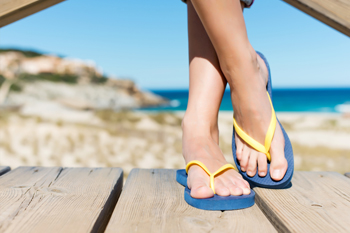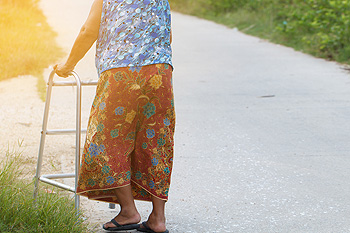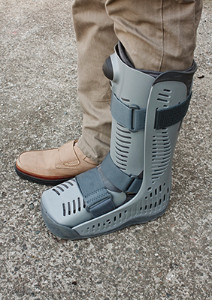Items filtered by date: November 2019
Are You Suffering From Ingrown Toenails?
An Achilles Tendon Injury May Cause Severe Pain
 The part of the body that connects the calf muscles to the heel bone is called the Achilles tendon. This tendon allows the foot to point and flex, and it is necessary for it to function properly in order to walk. It is susceptible to normal wear and tear, and may gradually rupture. This condition is called Achilles tendinosis, and can cause severe pain and discomfort. The noticeable signs that an Achilles tendon injury may have occurred is immediate pain in the calf and surrounding areas, limited mobility, and a popping sound may be heard at the time of the injury. This ailment may happen for a variety of reasons. These can include wearing incorrect shoes for a particular sport, exercising on uneven surfaces, or from medical conditions such as flat feet. Treatment may consist of performing specific stretches that can heal and strengthen the Achilles tendon, in addition to elevating the affected foot, which may reduce existing swelling. It is strongly advised that you consult with a podiatrist if you have endured this type of injury.
The part of the body that connects the calf muscles to the heel bone is called the Achilles tendon. This tendon allows the foot to point and flex, and it is necessary for it to function properly in order to walk. It is susceptible to normal wear and tear, and may gradually rupture. This condition is called Achilles tendinosis, and can cause severe pain and discomfort. The noticeable signs that an Achilles tendon injury may have occurred is immediate pain in the calf and surrounding areas, limited mobility, and a popping sound may be heard at the time of the injury. This ailment may happen for a variety of reasons. These can include wearing incorrect shoes for a particular sport, exercising on uneven surfaces, or from medical conditions such as flat feet. Treatment may consist of performing specific stretches that can heal and strengthen the Achilles tendon, in addition to elevating the affected foot, which may reduce existing swelling. It is strongly advised that you consult with a podiatrist if you have endured this type of injury.
Achilles tendon injuries need immediate attention to avoid future complications. If you have any concerns, contact Dr. Odin De Los Reyes of Connecticut. Our doctor can provide the care you need to keep you pain-free and on your feet.
What Is the Achilles Tendon?
The Achilles tendon is a tendon that connects the lower leg muscles and calf to the heel of the foot. It is the strongest tendon in the human body and is essential for making movement possible. Because this tendon is such an integral part of the body, any injuries to it can create immense difficulties and should immediately be presented to a doctor.
What Are the Symptoms of an Achilles Tendon Injury?
There are various types of injuries that can affect the Achilles tendon. The two most common injuries are Achilles tendinitis and ruptures of the tendon.
Achilles Tendinitis Symptoms
- Inflammation
- Dull to severe pain
- Increased blood flow to the tendon
- Thickening of the tendon
Rupture Symptoms
- Extreme pain and swelling in the foot
- Total immobility
Treatment and Prevention
Achilles tendon injuries are diagnosed by a thorough physical evaluation, which can include an MRI. Treatment involves rest, physical therapy, and in some cases, surgery. However, various preventative measures can be taken to avoid these injuries, such as:
- Thorough stretching of the tendon before and after exercise
- Strengthening exercises like calf raises, squats, leg curls, leg extensions, leg raises, lunges, and leg presses
If you have any questions please feel free to contact our offices located in Southbury and Farmington, CT . We offer the newest diagnostic tools and technology to treat your foot and ankle needs.
Wearing Flip Flops May Negatively Affect The Feet
 Research has indicated that frequently wearing flip flops may cause unpleasant foot conditions to gradually develop. These can include heel and ankle pain, in addition to increasing the likelihood of stubbing your toe, which may lead to a broken toe. The average flip flop has minimal support for the overall foot. This includes little cushioning in the heel and arch area, which can contribute to a lack of shock absorption. The toes may undergo stress as they attempt to keep the shoe on the foot, as a result of excessive gripping. People who wear this type of shoe often take shorter steps, which may alter their style of walking. Painful conditions such as heel spurs and plantar fasciitis may develop as a result of wearing flip flops. Additional information is available from a podiatrist about the harmful effects wearing flip flops could have on the feet.
Research has indicated that frequently wearing flip flops may cause unpleasant foot conditions to gradually develop. These can include heel and ankle pain, in addition to increasing the likelihood of stubbing your toe, which may lead to a broken toe. The average flip flop has minimal support for the overall foot. This includes little cushioning in the heel and arch area, which can contribute to a lack of shock absorption. The toes may undergo stress as they attempt to keep the shoe on the foot, as a result of excessive gripping. People who wear this type of shoe often take shorter steps, which may alter their style of walking. Painful conditions such as heel spurs and plantar fasciitis may develop as a result of wearing flip flops. Additional information is available from a podiatrist about the harmful effects wearing flip flops could have on the feet.
Flip-flops are not always the best choice of footwear. If you have any concerns about your feet or ankles, contact Dr. Odin De Los Reyes from Connecticut. Our doctor will assist you with all of your foot and ankle needs.
Flip-Flops and Feet
When the weather starts warming up, people enjoy wearing flip-flops. Flip-flops are comfortable, stylish, and easy to slip on and off; they're perfect for any summer beach goer. However, these shoes can cause harm to the feet.
How Can Flip-Flops Affect Me Long-Term?
- Ankle problems
- Hip problems
- Lower back problems
- Pain in the balls of the feet
- Problems with foot arches
- Changes in the way you walk
Are There Injuries Associated with Flip-Flops?
Yes. Since flip-flops are relatively weak and do not provide the same amount of support as sneakers, people who wear flip-flops regularly are more susceptible to injuries. On top of that, the open nature of the shoe makes your feet more prone to other problems, such as cuts and even infections. Common injuries and ailments include:
- Sprained ankles
- Blisters
- Infections
- Cuts and Scrapes
I like Wearing Flip-Flops. Are There Safe Alternatives?
When buying flip-flops, try to find ones that have sturdy soles and that are made of high-quality materials that will support for your feet. These flip-flops will cost more but will also last longer as a result.
If you have any questions please feel free to contact our offices located in Southbury and Farmington, CT . We offer the newest diagnostic and treatment technologies for all your foot and ankle needs.
Possible Methods That May Help To Prevent Falling
 Elderly people may experience a certain amount of instability, which may lead to falling. This unnatural movement has the potential of causing serious health ailments. Many patients who have fallen have developed a fear of falling, and this may prevent them from being as active as they once were. This may possibly cause the body to lose strength and flexibility. There are methods that can be implemented which may help to reduce the risk of falling. These can consist of increasing the lighting in the household, installing grab bars in the toilet and shower areas, and removing any existing loose carpeting. Research has indicated it may be beneficial to have a routine physical examination, and this may be helpful in determining the effectiveness of current medications. If you would like additional information about how falling can affect the feet, it is suggested that you consult with a podiatrist.
Elderly people may experience a certain amount of instability, which may lead to falling. This unnatural movement has the potential of causing serious health ailments. Many patients who have fallen have developed a fear of falling, and this may prevent them from being as active as they once were. This may possibly cause the body to lose strength and flexibility. There are methods that can be implemented which may help to reduce the risk of falling. These can consist of increasing the lighting in the household, installing grab bars in the toilet and shower areas, and removing any existing loose carpeting. Research has indicated it may be beneficial to have a routine physical examination, and this may be helpful in determining the effectiveness of current medications. If you would like additional information about how falling can affect the feet, it is suggested that you consult with a podiatrist.
Preventing falls among the elderly is very important. If you are older and have fallen or fear that you are prone to falling, consult with Dr. Odin De Los Reyes from Connecticut. Our doctor will assess your condition and provide you with quality advice and care.
Every 11 seconds, an elderly American is being treated in an emergency room for a fall related injury. Falls are the leading cause of head and hip injuries for those 65 and older. Due to decreases in strength, balance, senses, and lack of awareness, elderly persons are very susceptible to falling. Thankfully, there are a number of things older persons can do to prevent falls.
How to Prevent Falls
Some effective methods that older persons can do to prevent falls include:
- Enrolling in strength and balance exercise program to increase balance and strength
- Periodically having your sight and hearing checked
- Discuss any medications you have with a doctor to see if it increases the risk of falling
- Clearing the house of falling hazards and installing devices like grab bars and railings
- Utilizing a walker or cane
- Wearing shoes that provide good support and cushioning
- Talking to family members about falling and increasing awareness
Falling can be a traumatic and embarrassing experience for elderly persons; this can make them less willing to leave the house, and less willing to talk to someone about their fears of falling. Doing such things, however, will increase the likelihood of tripping or losing one’s balance. Knowing the causes of falling and how to prevent them is the best way to mitigate the risk of serious injury.
If you have any questions, please feel free to contact our offices located in Southbury and Farmington, CT . We offer the newest diagnostic and treatment technologies for all your foot care needs.
A Broken Foot May Be Common in Children
 A broken foot can be a common ailment that may occur in children. This can be a result of the bones in the feet that have not fully developed and are more fragile than the bones in the adult foot. If a broken foot occurs, noticeable symptoms often include severe pain, redness, swelling, and it may be difficult to walk on. Your child may find moderate relief when the affected foot is elevated, and a splint may temporarily be applied that can provide the necessary support. After a proper diagnosis is performed, which generally consists of having and X-ray taken, a cast or a protective boot is worn that can limit excess movement as the healing process takes place. If your child has fallen, and complains of foot pain, it is suggested that you consult with a podiatrist who can properly treat a broken foot.
A broken foot can be a common ailment that may occur in children. This can be a result of the bones in the feet that have not fully developed and are more fragile than the bones in the adult foot. If a broken foot occurs, noticeable symptoms often include severe pain, redness, swelling, and it may be difficult to walk on. Your child may find moderate relief when the affected foot is elevated, and a splint may temporarily be applied that can provide the necessary support. After a proper diagnosis is performed, which generally consists of having and X-ray taken, a cast or a protective boot is worn that can limit excess movement as the healing process takes place. If your child has fallen, and complains of foot pain, it is suggested that you consult with a podiatrist who can properly treat a broken foot.
A broken foot requires immediate medical attention and treatment. If you need your feet checked, contact Dr. Odin De Los Reyes from Connecticut. Our doctor can provide the care you need to keep you pain-free and on your feet.
Broken Foot Causes, Symptoms, and Treatment
A broken foot is caused by one of the bones in the foot typically breaking when bended, crushed, or stretched beyond its natural capabilities. Usually the location of the fracture indicates how the break occurred, whether it was through an object, fall, or any other type of injury.
Common Symptoms of Broken Feet:
- Bruising
- Pain
- Redness
- Swelling
- Blue in color
- Numbness
- Cold
- Misshapen
- Cuts
- Deformities
Those that suspect they have a broken foot shoot seek urgent medical attention where a medical professional could diagnose the severity.
Treatment for broken bones varies depending on the cause, severity and location. Some will require the use of splints, casts or crutches while others could even involve surgery to repair the broken bones. Personal care includes the use of ice and keeping the foot stabilized and elevated.
If you have any questions please feel free to contact our offices located in Southbury and Farmington, CT . We offer the newest diagnostic and treatment technologies for all your foot and ankle needs.

